What were you doing on September the 14th of this year?
How long ago does that feel to you? Perhaps it feels a long way, indeed?
Now, consider how you would be feeling if you too had spent all that time alone, out in nature? Seems a long time, right? And I still had weeks to go.
It took me a long time to realise that what I did, back in 2010, is not really normal. People don’t just walk into the woods and stay there on their own. It isn’t the done thing. It has taken me even longer to begin to tease apart how this adventure of mine shaped me, and how it could, in turn, shape others.
If you have no idea what this message is about (perhaps you signed up to my mailing list as a part of a book giveaway?), or why you are receiving it, head to this introductory piece, which also contains a chapter listing, with links. Below is the seventh week of A Fall In Time.
The Eagles are Coming!
When I left my shelter to send the blog I had crafted the previous day, I saw a lazy shadow on the ground, from somewhere above me. A fully grown, adult golden eagle was circling my camp, perhaps five metres (16’) above the treetops. At that distance, it felt huge and it felt dangerous. Just how immense quickly became apparent when two buzzards appeared and tried to mob it. What an amazing sight. I felt extremely privileged to have witnessed such an awe inspiring wonder of nature.
Journal One. 27th October 2010.
There is always something wonderful about seeing eagles, I will never get bored of them, no matter how many I observe. This one barely flicked a wing as the buzzards continued to dive towards it, trying to drive it off. Even when they were joined by a pair of ravens, the eagle continued its slow circle, knowing it ruled the skies. The buzzards looked small beside it, the ravens smaller still. There is no wonder the eagle has been—and still is—held in such reverence by many around the world.
The (bad) photos from this day were taken once I tore my gaze away and could get my phone out of the pocket and sealed, waterproof plastic bag in which it permanently lived, turn it on and open the camera. Why was it that, whenever I had an excellent view of the eagle, I never had my real camera? As such, you’ll just have to take my word for it that on this photo there is an eagle and a pair of buzzards, circling higher, spiralling directly above me.
One day, I’ll get a good eagle photo. One day. (It was NOT this day.)
On this day, I spent considerable time writing or in my shelter, riding out another ferocious storm, in between fists of wind sawing and chopping logs for the fire. I also had the bright idea of raising the doorstep to the shelter, with two lines of rocks, then placing a log into my doubled-over poncho which served as a door. This way, it stopped blowing open in the strong wind, the weight holding it in place, rather than relying on the nails I had scavenged from the beach and the poncho’s eyelets.
Other notes in my journal include my slow attempts at blowing smoke rings from my pipe, the reappearance of the tiny shrew right next to where I sat, shrieking away in some sort of constant rage, and the mouse, collecting heather from my thatching to furnish its own home, making considerable noise above my head, as I tried to fall asleep—all of which I had forgotten until I reread my own words.
The storm continued as I fell asleep to the snip snip scurry of my little rodent companion, very thankful for my shelter and that I was not tied to two trees in such powerful winds.

A Calm of Uncertainty
October the 28th, 2010 was another no photographs day. It carried on raining, and raining, and raining, but I managed to go for a walk, finally finish the bracken thatching, and gather and prepare twenty more metres (66 feet) of oaken logs for my fire.
Prior to finishing the bracken thatch, if the wind was from the west then the fire had a tendency to smoke, sometimes making it uncomfortable when I was cooking. Once the thatching was complete, this was a thing of the past, and the smoke would rise straight out the gap at the top, as I had planned. As with any natural shelter incorporating a fire, it is important to be spark-aware, something which becomes second nature after a time. The next layer for thatching would be leaf litter and forest floor debris, before a final cover of rolls of moss. I wanted the moss to remain alive—this would mean that it would maintain a high moisture content, in theory arresting any sparks before they could set the shelter alight. Errant sparking on the inside of the shelter, however, was my responsibility and I maintained a high level of vigilance.
The days were getting shorter and shorter and I was spending more time sitting by the warming fire, carving Christmas presents and writing in my journal. Along with a record of my days and events, I kept detailed notes on how I felt, how the process of being a part of nature was making me think, about the world, and about my place in it. By this point, I had been gone long enough from my previous, city-based, life that messages were much more sparse—out of sight in the woods, out of mind.
In some ways, this did not bother me as much as I had initially thought it might. Instead, when I did receive a text message or email, it felt like a true gift—and I relished considering my reply, sometimes writing these in my journal, before I made the journey to a spot of phone signal to send them. My phone battery was a precious resource.
On this day, I referenced my job, and noted that I had more-or-less made the decision to hand in my notice, but was holding off that final act until closer to the date. I knew I wanted to spend weeks more out in those rapidly-cooling, wet woods but, instead of feeling stressed when considering the city, my job, my friends, I felt relaxed, in a manner I had not felt for years, knowing I had made the right decision to move on.
My future was in many ways uncertain—yet I have always thought this phrase a poor choice of words, for who can ever be certain of their future? And if you feel you are certain, then where is the excitement of spontaneity, or the magic of surprise? No, I was happy with an uncertain future, I had made an escape of sorts, and I was enjoying days of utter freedom in the woods, everything boiled down to basics—shelter, fire, water, food, and thought.
The Silence of Flagging Testosterone
Still raining…
Journal One. 29th October, 2010.
These were the final words to be written in the first moleskine I filled, which felt remarkably fitting. All the gaps in the journal were now full, something which still makes me happy. I have a bad habit of moving to another shiny and new notebook far too quickly, so this economy of pages was satisfying and a reflection of this period of my life, where I was careful to ensure everything I had carried with me (and the things I found, too) was used well, with additional multi-purpose uses frequently discovered or enacted.
(An example of this is to be found in the tiny literary pocket companion book I carried, a gift from my sister Lydia. I read and reread this, absorbing all manner of strange details, facts, and tales, but also using blank portions of the book to record some notes and, eventually, once winter darkness forced me to spend more time in my shelter awake, copying out fiendish-level Suduko puzzles I would find on the internet, during the minutes I had my phone switched on, then completing these over the course of the day.)
The photographs show the view from my door. Compare these to that shown in Week Five of A Fall in Time, on the 16th of October—two weeks had made a big difference in leaf cover and colour. (In Saturday’s compilation post, I’ll pop these two images side by side.) You can also see here how, with all the wet weather and coming and going, the entrance to the shelter was churned mud. Eventually, I dug this out and replaced the dark, peaty soil with faster-draining sand and rocks, which I laboriously carried in a plastic oil drum I repurposed.
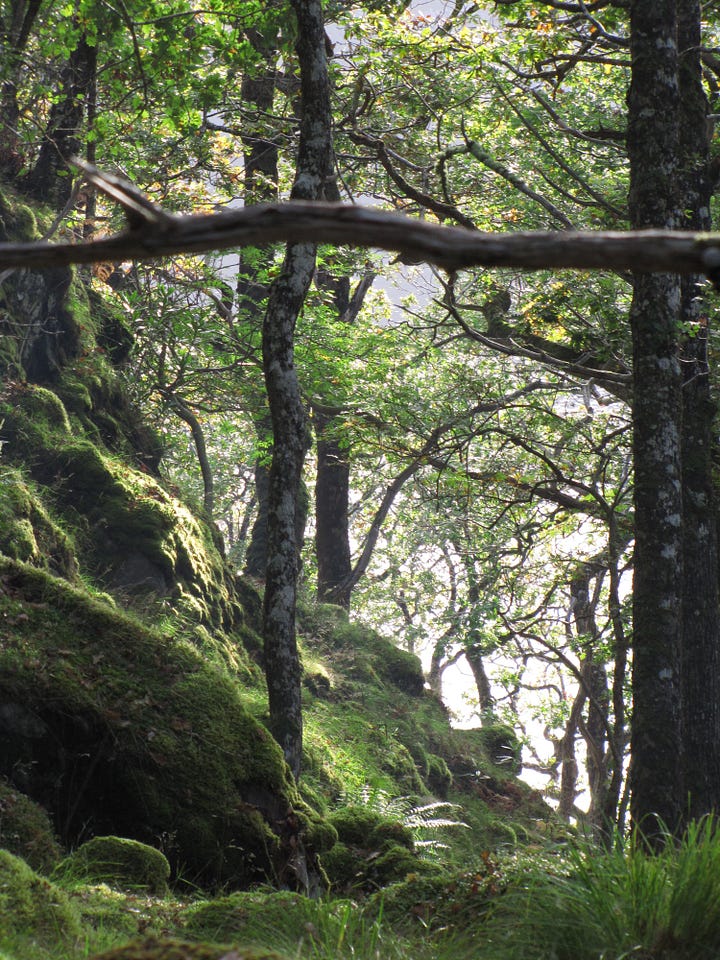
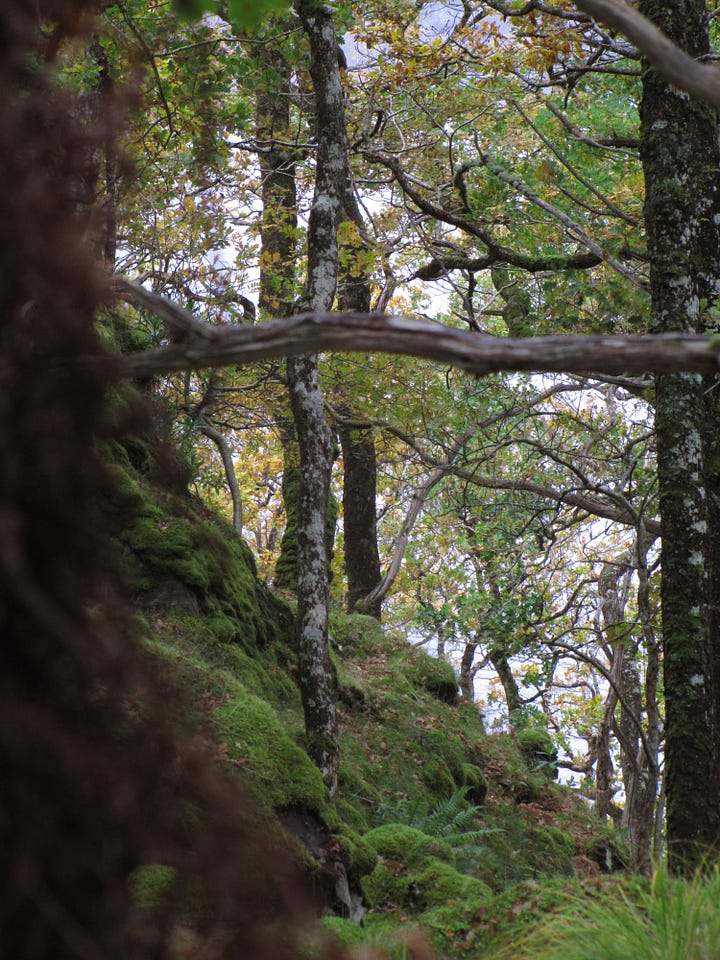
There was no doubt that autumn was falling faster and faster, and winter was already scratching around the outside of my shelter, somewhat like the mice in the night or, later, the tawny owls who sat in the tree above the shelter, their talons flexing and releasing as they enjoyed the heat and smoke from the fire, scritch-scratch, scritch-scratch.
There were fewer and fewer insects as the cold nights continued and my shelter was not a safe harbour for those which thought they could use the heat from the fire to stay alive and active; the wren, the robin, the blue tits, the mice and the shrews all continued to inspect the walls and roof and floor, taking it in turns to clean and clear. They had almost no fear of me, as a creature, other than if I made sudden, sharp movements, which was not often, for I was moving at a different pace, now.
There is a smoothness of motion which comes from being out in nature for a lengthy time—an economy of movement, and a care when moving, becoming second nature. Feet fall quietly, breathing is slow and steady, footsteps at the same rate as your heartbeat. Nothing is rushed, for all burns down to a question of exertion, a question of calories, a ponder why we would need to go any faster, anyway?
My nights were longer now, and quieter, other than the rainfall and wind, which was more of a lullaby than the clashing and roaring of the deer. The rut continued, but not at the same intensity. Soon, the stags would relinquish control of their harems, forget their quarrels and band together to try and survive the winter, their bodies dangerously depleted in weight and calories. Often, the strongest stag at the rut, the one which sires the most fawns, is also at the greatest disadvantage when winter arrives. Weeks of not, or barely, eating, weeks of little sleep and bouts of regular, intensive exertion all talking their toll. I’m sure there’s a lesson to be learnt there.
Personally, as November approached, I was happy I was taking more care of my own body. Happy I was warm and mostly dry, happy to be eating well, and happy my own social diary was still completely empty, unless you were to count those owls.
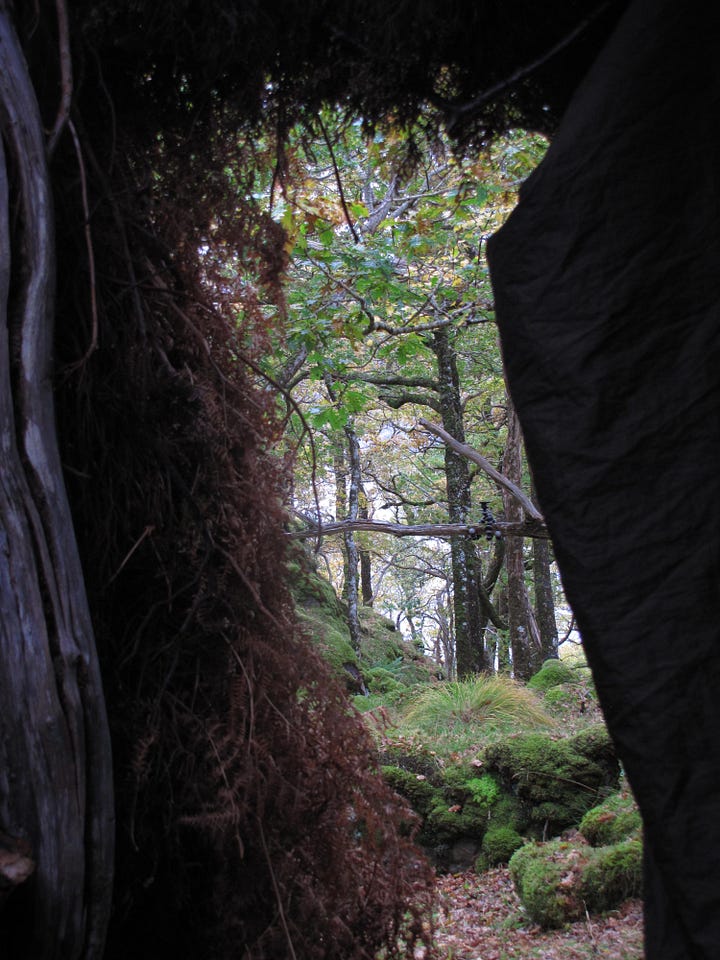

Of Bracken and a Walk in the Woods
Sat here at half seven, fire blazing, dinner cooked and eaten, smoking my pipe. This time tomorrow, it will be half past six, and it will have been dark for an hour already. Winter is nearly here. But today! Today, the sun came out and all was golden, brown, russet, acid yellow, and rich emerald green. A beautiful autumnal light infused everything with colour against the slate grey sky and twinkling silver of the loch.
Journal Two. 30th October 2010.
On this day, I went out for a long walk, enjoying the lack of rain and revelling in those intense colours. I managed to take 193 photos.
My shelter—now named Two Skull Shack—was doing a great job of actually sheltering me. The bracken really was fantastic at shedding the rain and cutting the wind. Bracken is actually pretty rubbish as an insulator—when you read stories where the hero makes a bracken bed, you can tell the author doesn’t really know much about woodcraft. Bracken flattens down, barely trapping any air to warm, it harbours too many ticks, and is generally sharp and uncomfortable. It is, however, very good at windproofing, when mixed with other layers, and those sharp edges can be fantastic at holding leaf litter in place.
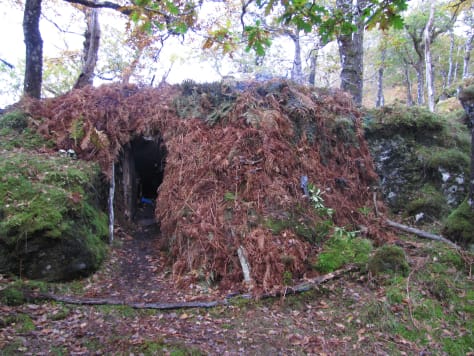
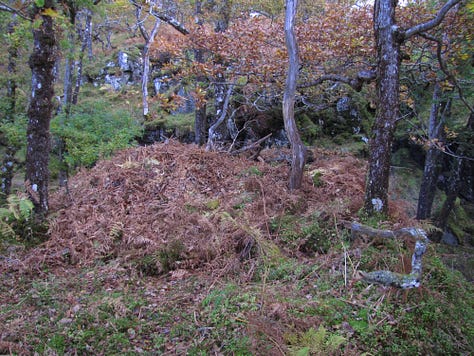
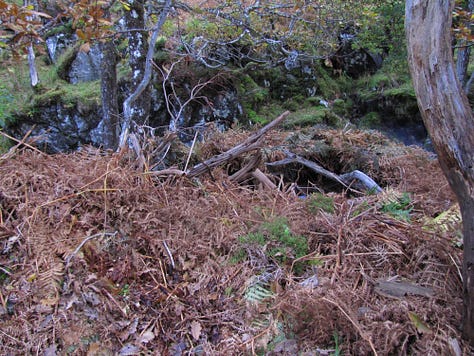
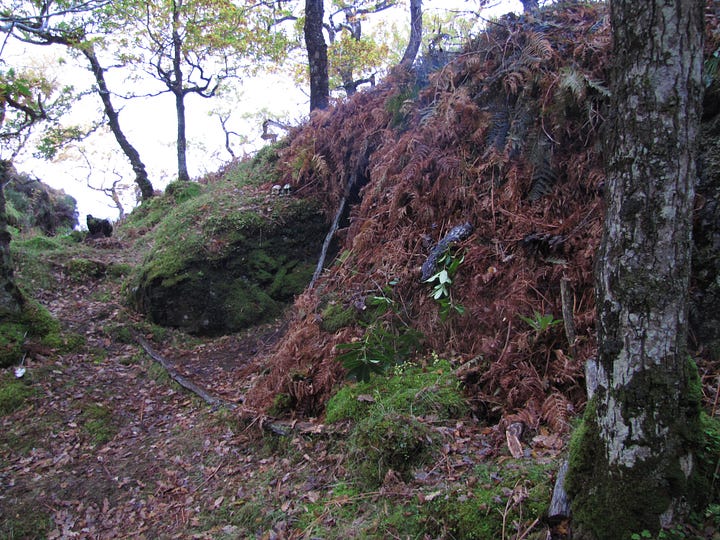
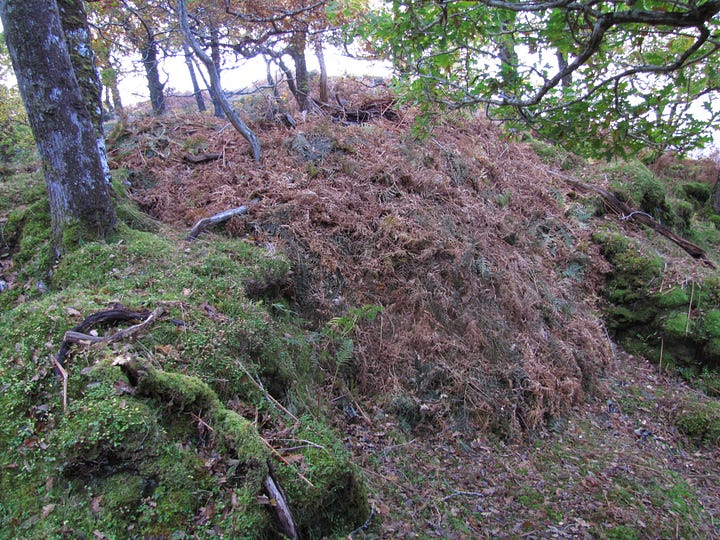
This was to be the next layer of my shelter—leaf litter and general forest-floor detritus. Then the final coating would be one of moss, rolled and unrolled like the living carpet it is, making the shelter simply disappear entirely. This day was the first I noted that I was getting a little tired of thatching the shelter, that I would rather be doing other things, even if I knew the layers I had to add would make a huge difference. I was eating well, but the calorie expenditure out in that environment is considerable when working as hard as I was, and I was increasingly tired, partly also due to the changing of the seasons, a point of the year where the idea of hibernation becomes appealing to me.
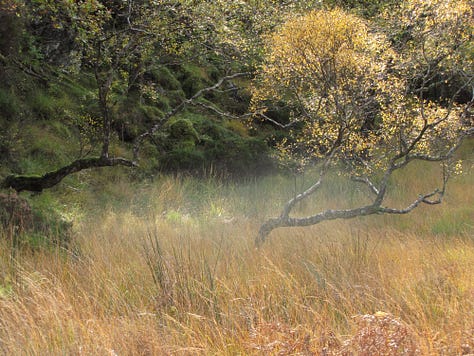

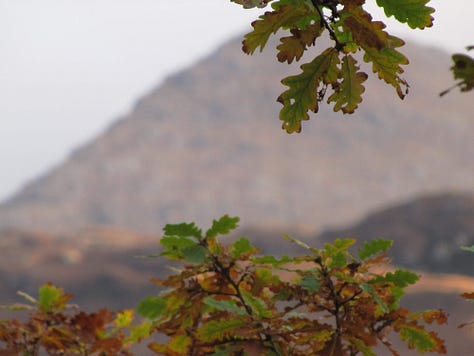
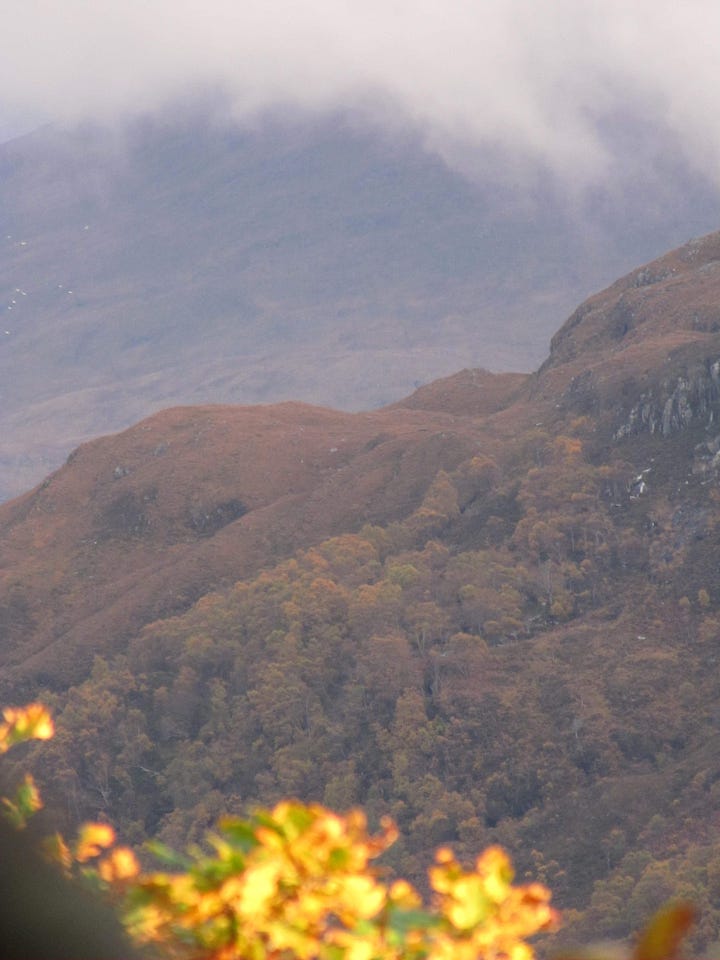
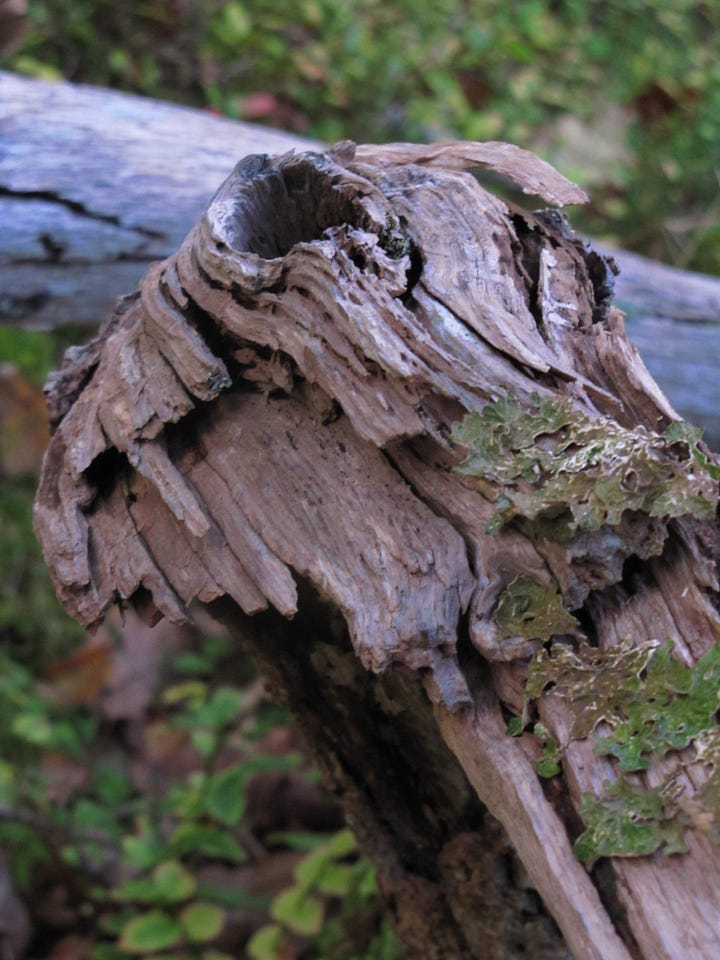
On my walk, I took photographs of the larger views and portraits of trees, but I also began to focus on the smaller details. A tiny oak growing from the previous year’s acorn, a small rowan or birch sapling, moss, lichen, cracks and holes, leaves and gnarled branches. I tried to capture a feel of what it meant to be alive in those woods, how views would appear and disappear, swiftly obscured by tree and leaf, how the mist would rise in the glen, or the eye would be caught by the brilliant red of bilberry leaves. It is these details which I find endlessly fascinating, how so many tiny stories make up a vast sweeping epic, how it all fits together, and how easy it is to disturb that equilibrium if we are not careful—or simply care not.
Whenever I gathered fuel, I was careful to select branches which harboured the least life possible. The weather would sculpt the dead oak trees, carving them into curious shapes which would soon be coated in lichen, mosses, fungi, ferns, and even flowers. Insects would live within the wood, and birds would try to remove them. I have said it before, but the amount of life a single oak can support, both whilst it is alive and long after, is phenomenal.
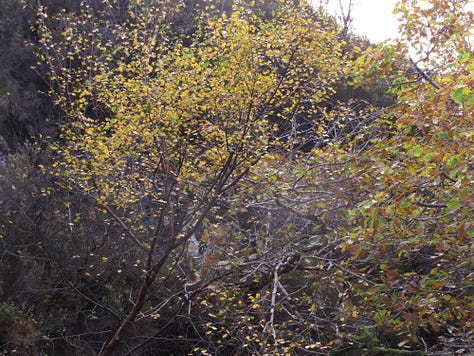

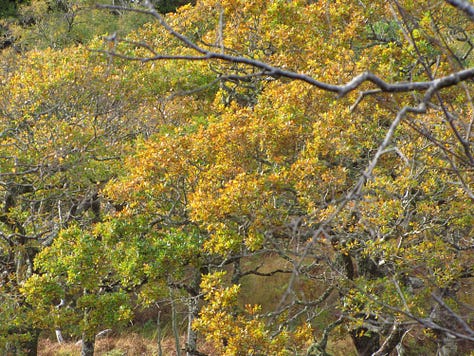
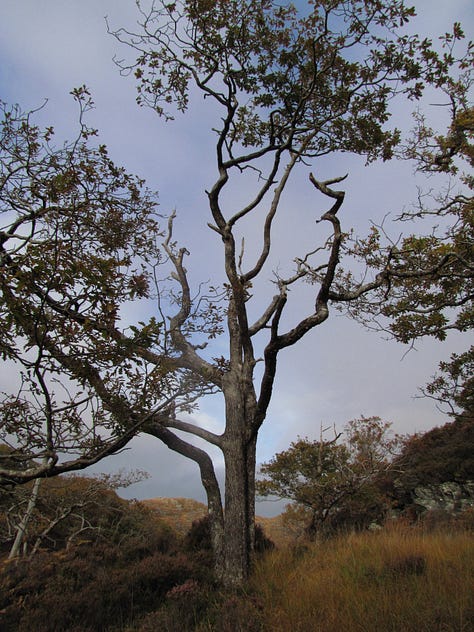


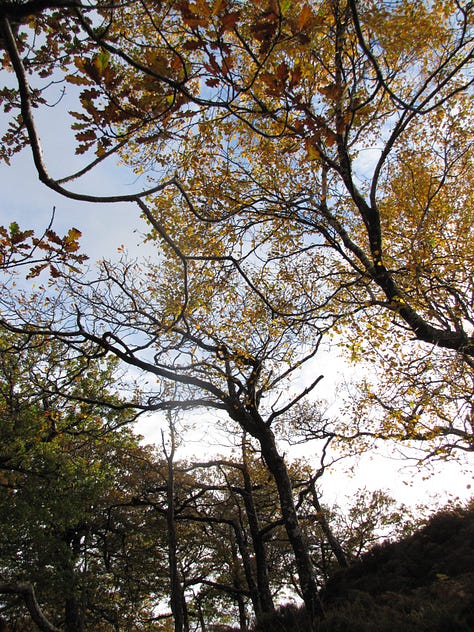
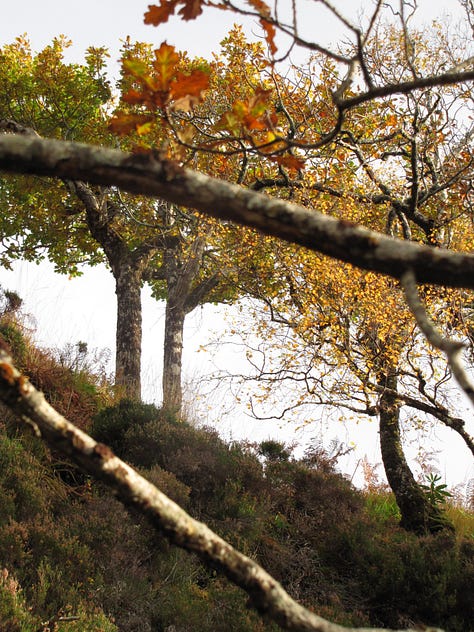
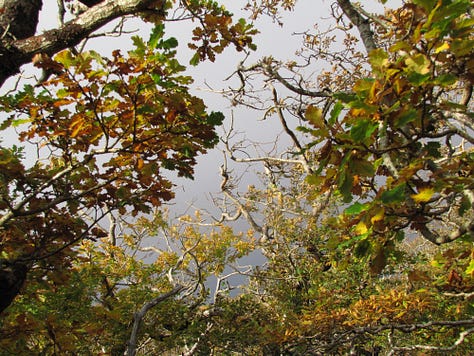
An Affinity With Bogs
The sun went down some time ago, and it was a bloody, beautiful sunset. Fully befitting of Samhain. I have just heard a deer roar, first time for a while; I thought the roaring was totally finished, so perhaps he is celebrating the turning of the year and the sleep of the May Queen?
Journal Two. 31st October 2010.
I had some startling, vivid dreams to bring me to this day, dreams I recorded in my journal, noting the strength of these dreams—at one point, I woke up, got out of my sleeping bag and had a pee, a bit shaken by their content. I rolled and smoked a cigarette, something I never used to do in the middle of the night, then went back to bed after a time, only to re-enter the dream where I had left it. That is something powerful, something strange, and oddly fitting for this day. There was death and love involved, as well as a tattoo on my right leg of an electric blue, 3D violin, shimmering and moving as though real.
This day, I went for a long walk, further into the hills than I had done previously, encountering deep bogs, wonderful trees, a riot of fungi and stunning vistas. I took 145 photos, slightly fewer than the day before, but still enough to give me a headache choosing which ones to share.
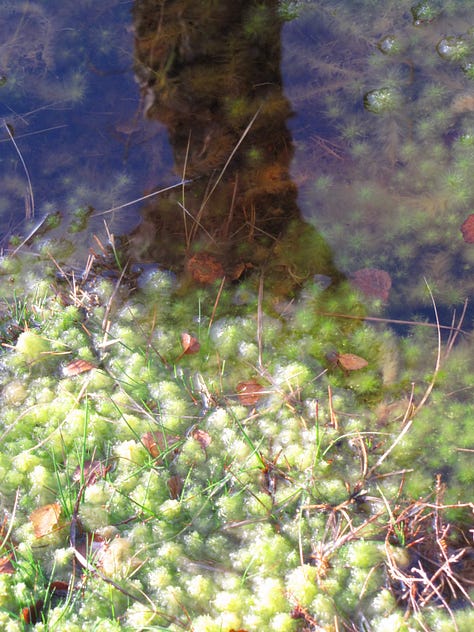
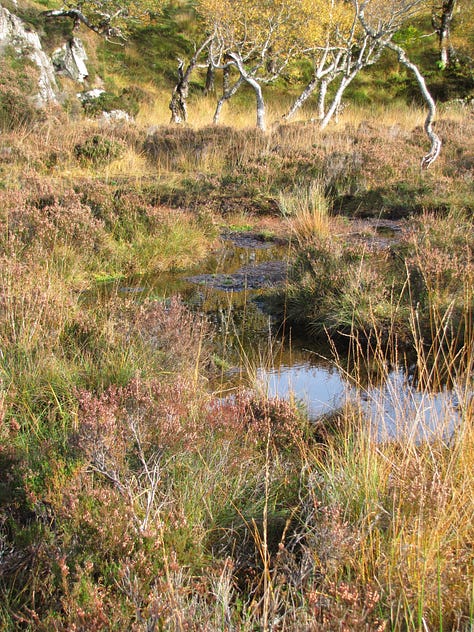
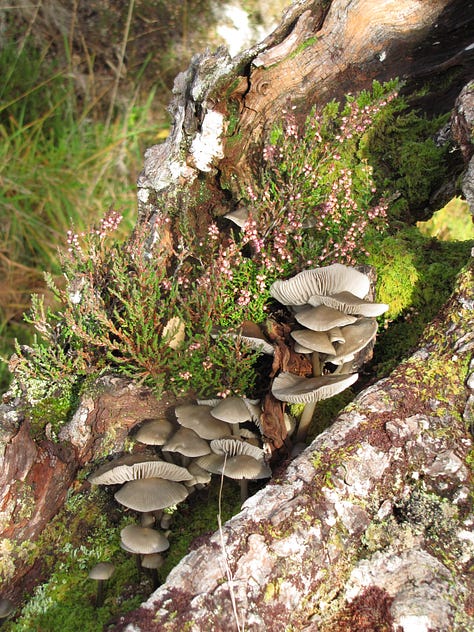
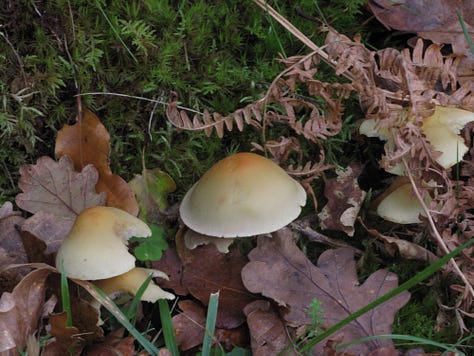
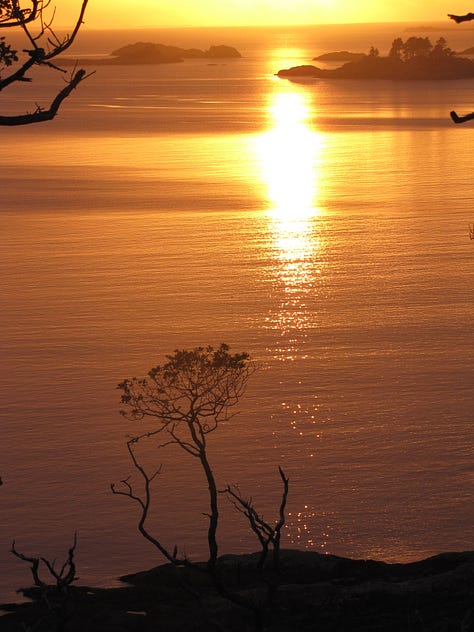
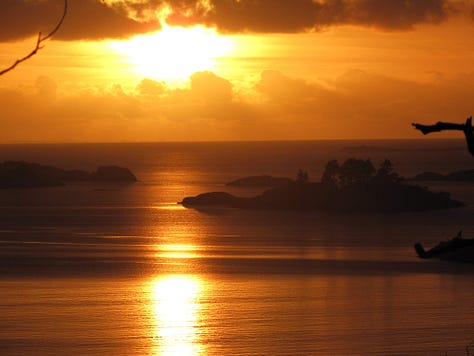
I always feel a strange affinity with bogs, as though they are places close to me. Perhaps this stems from when I was a child—even before we moved to Orkney, we lived in land which was once a vast bog and, as Tove Jansson wrote, you can drain a bog and it will still go on behaving like a bog. Perhaps it is the same with those who were transplanted from such an environment? Orkney has her own share of bogs, with tales to accompany them.
One such is the story of Betty Corrigall, buried in an unmarked, inter-parish grave in the late 1700s, following her suicide. Her whaler boyfriend had abandoned her, returning to the ocean, despite her being pregnant at the time. At some point in the 1930s, more than 150 years later, her grave was rediscovered, her body found to be perfectly preserved. Sadly, following this, soldiers stationed in Orkney during the second world war repeatedly dug her up, which caused her body to decompose.
(The composer and multi-instrumentalist, Erland Cooper, had a dream where Betty Corrigall visited him, telling him he must write an album based on his homeland, Orkney. This became ‘Orkney: Symphony of the Magnetic North’. Since then, he has often revisited Orkney in his music. I remember him from a few years below me at school, where his father also taught (although I never had him as a teacher), and I enjoyed lessons with his mother, who was a substitute teacher, often for English. His older brother, Tristan, taught me more advanced chess (and bridge), during our Friday afternoon ‘Activities’ at Stromness Academy, a memory I still draw comfort—and knowledge—from. Erland’s work is certainly worth listening to, often deeply carrying the isles within its composition, which can be at times haunting, at others stirring.)
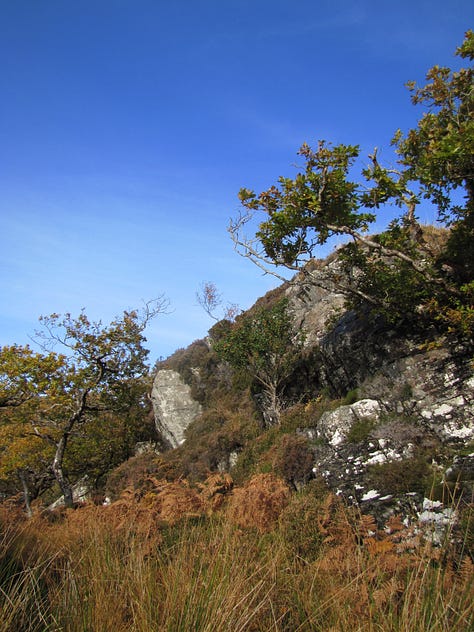
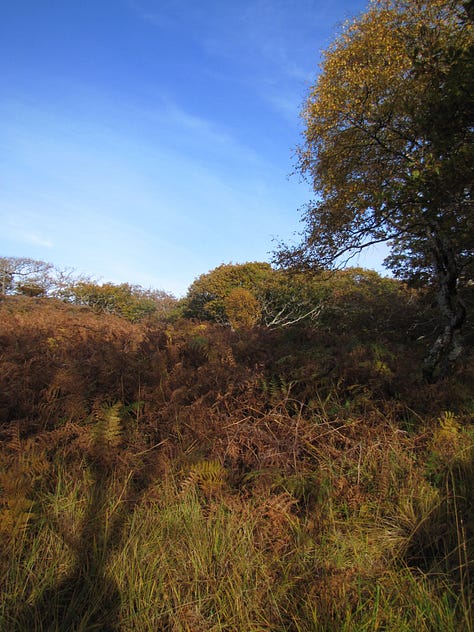
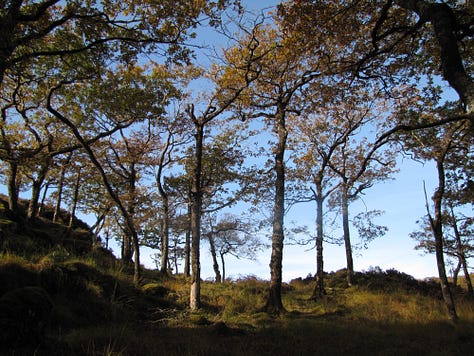
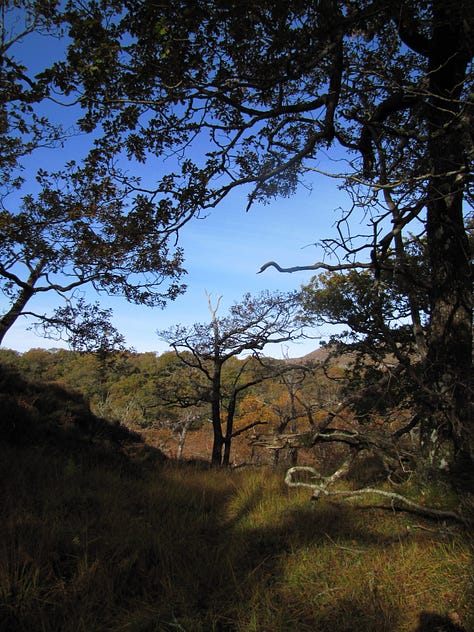
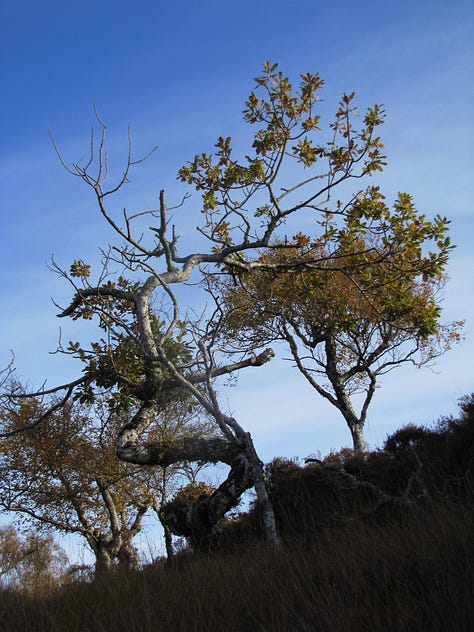
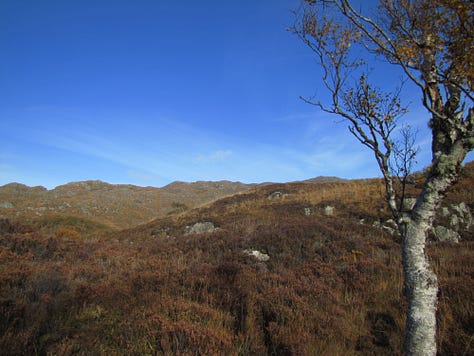
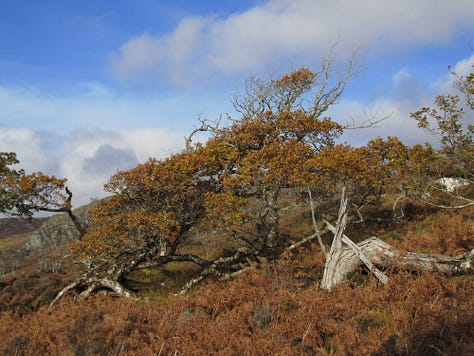
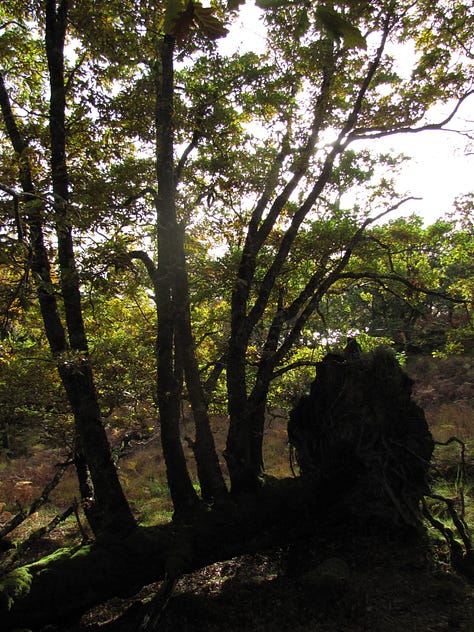
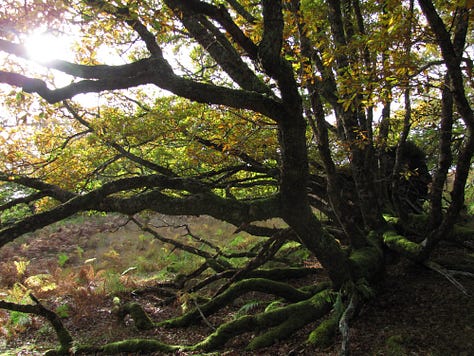
Those bogs I walked by that day, threading my way through carefully, harbour their own secrets, I am sure. I often think of this when I cross a bog—what lies beneath? What—or who—is preserved within those peaty depths? I have seen tree stumps, felled by beaver, where there has been no beaver for centuries. Similarly with the archaeology, wood preserves here, remnants of pasts neatly filed away and forgotten by all but sphagnum and black water. Sometimes, when viewing your reflection in the still waters of a bog, it is almost possible to imagine someone else looking back at you—something effectively leveraged by Tolkien, who wrote that he drew inspiration for The Dead Marshes from his time in northern France, after the Battle of The Somme.
Bogs are also another reason I do not walk around in the dark in some areas of Scotland, unless I am absolutely sure of my path. As much as I love it, at this point I’d really rather not become a permanent part of the land- and time-scape in that way.
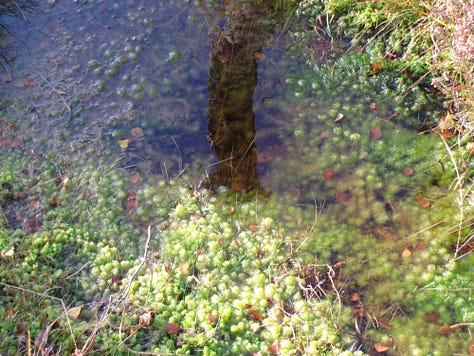
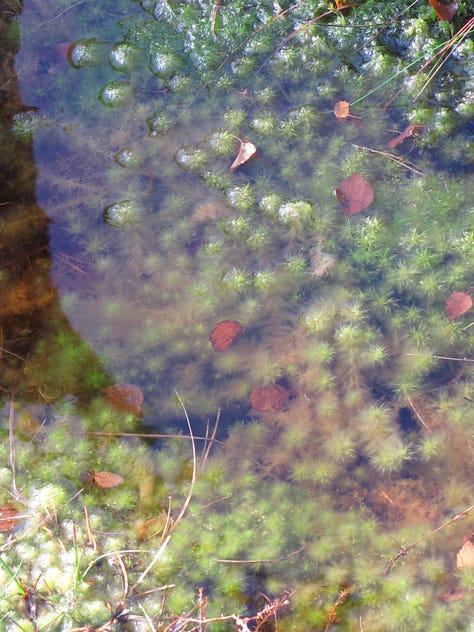

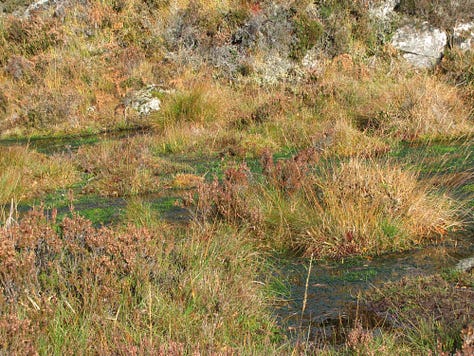
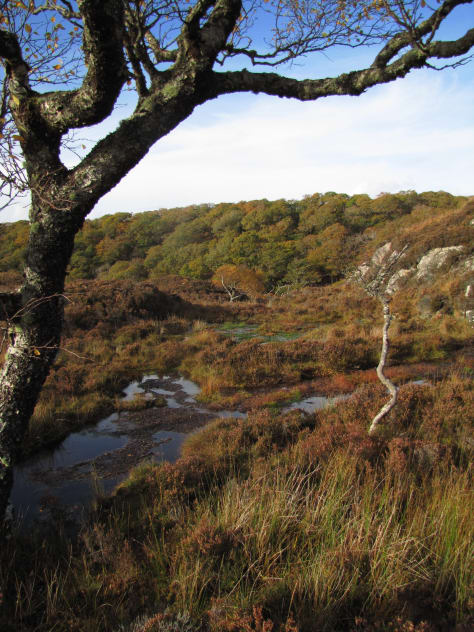
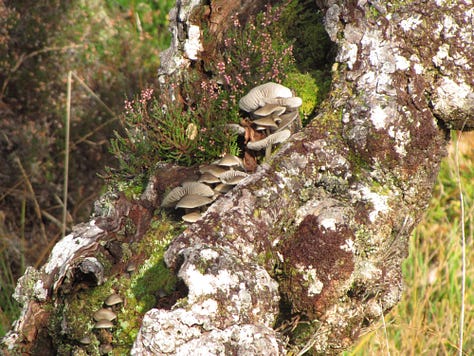
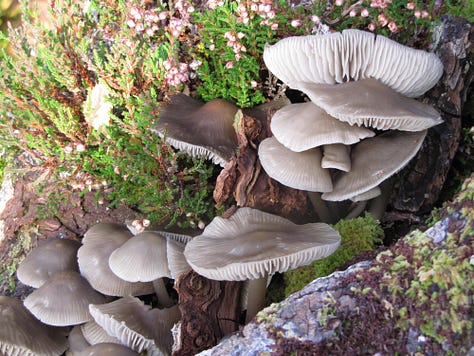
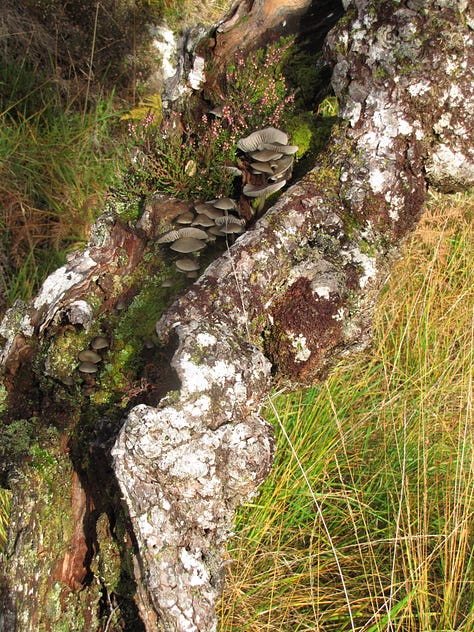
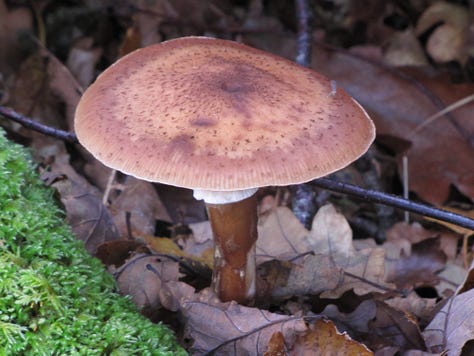
On this day, I noted that the novel I had felt brewing for some time should be started soon, after I finished thatching my shelter. My journal also records the following, something I enacted, incorporating a rather warm and blissful wash:
I plan to dance around the fire later, maybe even stark naked. Why not, I ask you?
Journal Two. Hallowe’en 2010.
Why not, indeed?
As I crafted the last paragraph that day, my trusty pen finally ran out—which felt strangely fitting for the date.
A Place, Invested in Memory: A Tale for Halloween.
This is an edit and extensive rework of a post I shared on my sister’s website, back in late October, 2010. As I have mentioned in this ongoing series, I would handwrite each blog post, photograph it on my trusty pre-smartphone, and send it to her to then transcribe, edit and post.
Above, I have linked to the piece I shared already this week, full of strange happenings and potentially ghostly goings on.
Of Wind and Lies
It is the first day of November today, and it feels like it. Nature is closing her shutters, fastening her doors and wrapping herself in blankets for the approaching winter. There is a weak sun, with a fair covering of cloud, but it is the wind that chills; leaves are cascading, fluttering to charge the forest floor with nutrient goodness for next spring… but the light through the remaining leaves is heavenly. Then comes another gust and hundreds of leaves float to the ground, in fact, as soon as I wrote that line, one landed on my Moleskine, it is now safely tucked into the envelope at the back…
Journal Two. First of November, 2010.
This leaf remains in the envelope to this day, a part of a symphony—memory, words, and physical desiccated, brown oak leaf—each of which provides considerable, tangible depth to the whole experience each, on its own, but a small refrain.
After a couple of days of good weather, it took a turn for the worse with the coming of November. Rain started to fall—or blow—in horizontal showers, but it was the wind that made things feel like winter, the leaves being torn from the trees, and the wind chill considerable.
I had a day in and around my shelter, washing clothing and myself, gathering and preparing fuel, and writing. I took no photographs, giving my camera a rest from the previous days exertions.
By nightfall, the wind was approaching a strength I had yet to experience that autumn. I could feel the ground shaking, rippling, as the trees were pulled, their matted roots clinging to the shallow soil and fighting back, each protecting the others in turn. I was glad I was in my shelter, and not in a hammock, but I had planned to go to the village of Mallaig on the second of November, to pick up a parcel my sister had sent to me, poste restante, and this was beginning to look less likely.
I know wind. It is an old friend, a lover of sorts. Indeed, wherever I travel on this remarkable planet of ours, I find a home in the wind; places which experience strong or constant movement of air are comforting, they relax me, even as they are tiring others. Growing up in Orkney will do that to you, it is no exaggeration to say that the wind there is a power beyond the realms of normal experience.
Many was the time, after leaving the islands for the south, that I would be talking of the wind and the waves, how I once saw a caravan blow past our house, or the stories of chicken sheds being blown out to sea, to arrive—with the chickens still roosting in their rafters—in Norway, and I would see people smiling, or shaking their head. They did not believe me when I said that the gusts would go off the scale at the local meteorological station, and that I once saw a boy picked up and fly through the air, for a considerable distance, before landing face-first on the playground. At some point, I gave up providing details to most and simply told people Orkney was windy. Which is a vast understatement, like saying the ocean is wet, but I was tired of being made out to be a liar.
It is fascinating, how our species can behave when faced with discussion of something of which they have no experience. This is a topic I often consider and, I feel, it makes a lot of the news we hear make more sense when we realise that. We struggle to place meaning on that which we do not know and, the more I consider this, the more I think this lays beneath many of our problems as a species.
This wind, that night, reminded me of Orkney, but it carried the added danger of trees. Up in the north, there are very few such to be broken, to fly through the air like my friend Graham. The roofs are carefully constructed, so tiles and slates do not come free, the buildings are mostly squat and positioned out of the wind, for the most part. In a woodland, no matter the legendary strength of oak, branches are ripped apart and move through the air like weapons. If you have ever been hit by a falling acorn, imagine what a whole limb will do.
I recorded that, should I continue with my plan to pick up my parcel, it would definitely be an interesting adventure to pick up that parcel.
That day, my journal also records this:
I have done hours, even days and I suppose weeks of thinking. I have tried to process everything that has happened in my life, try and put certain things to rest, shed doubt and fear and generally try and reach a calmer state of mind.
Journal Two. First of November, 2010
There are several pages devoted to these thoughts and, especially, the ideas I had for what was to come next. I made up my mind to retire the anonymous blog I had kept for some years and delete the content—something which I later did and, to this day, still wonder if it was the right decision. I scribbled lists of ideas and potential pathways, some of which finally came to pass years later, and some has yet to happen, but remain goals I work towards nevertheless.
It is an odd experience, rereading those pages of my journal, remembering writing those words, the fierceness of the storm somehow underpinning the whole. Before bed, I built up the fire and had a wash, wrote a small shopping list of luxury items (more pipe tobacco, black pudding, onions, for example), and felt much calmer after having shared the thoughts on paper.
Sometimes, it seems, it takes a good storm to aid with airing the mind, it takes a powerful wind to strip away doubt and fear, sadness and loss, and send it spinning out into the mountains to the east.
Weather is a powerful magic—a powerful medicine indeed.
Storms and Deep Thought
This is one huge storm.
Journal Two. 2nd November 2010.
Seven weeks in the woods.
This was a busy day, and an eventful one. I took no photographs, but I did record a long series of journal entries, which I reworked into an equally long blog post, mostly a blow-by-blow account of the day.
I recorded how the storms had increased with each visitation, rising in power, becoming longer, more powerful, then subduing for a time. I wrote how I decided to still venture out on my trip to the post office for my parcels and how it was a wet, icy, treacherous journey, but I made it to the station safely.
Looking back and rereading the blog post I shared is an interesting experience. It amounts to 2993 words and it is strange, to note the feelings I had whilst I crafted that post, what mattered to me, who mattered to me, how I felt I was a completely different person from he who left the city in September, how odd talking to strangers in a village felt, and how I initially had difficulty remembering all the rules of society. I seemed to be someone else, someone different. In some cases, I volunteered more information than I would have done before, my confidence altered.
Being alone in the woods can do weird things—I once got back from two weeks out in other northern woods, not too far from where I stayed in 2010 as the crow flies and, on the return journey, realised I was still carrying my knife around my neck when I was walking through a service station south of Glasgow, no thought given to rules and laws about blades—the knife simply belonged there, where it had been used over and over again over those days.
There are parts of that blog post I still like, especially when talking about the practicalities, of nature, of food and drink and the stars. Other portions, however, irritate me. I had clearly addressed parts of this post to the woman with whom I had been involved before leaving Sheffield, a complicated, difficult and ultimately flawed relationship. I suppose meeting other people and actually talking to them—something which happens more in smaller villages like Mallaig than it does in towns, like Fort William—meant I thought of her and wanted to reach out.
In some ways, this was a good thing. I was shedding my skin, I was stretching my wings, and I was becoming someone, not different, exactly, but someone more akin to who I really was or, perhaps, could or should be. It was to take a lot of time to unravel the tangled skein of my life, but I continued working at the knots.
The storm that day was wild. If you do want to see pictures, then follow the link to the local community newspaper.
The headline story, ‘Lifeboat Saves Coaster’ was from this day. The lifeboat was launched from the village I walked and caught the train to, Mallaig. This is the end of the line, a small port, where the road and rail stop. To continue, you need a boat, or go on foot along the rugged and often dangerous coastline. It was this stretch of coast I have visited on several other occasions—no one really ever goes there, there are no paths, no level sections of ground, just rough and steep terrain, full of shifting rocks and sudden holes. The area deserves the name it possesses: the Rough Bounds.
At Mallaig, the waves were breaking over the sea defences, right up over the road. My journal records how I was quickly soaked with sea spray, but it does not mention the lifeboat, I was only to discover it had been launched later. It does not say what it must have been like, to head to sea—as a volunteer—to risk your life for strangers over an eleven hour battle to save a boat and prevent a wreck, and potential ecological mess, on the island of Rum.
The coaster was saved, after the lifeboat managed to get a line aboard and hold it off rocks, until the emergency tug, the Anglian Prince, arrived to take over. Without that lifeboat, without the tug, the Red Duchess would certainly have run aground.
Just days before this event, the Conservative government decided that the £32million price tag on the fleet of four emergency tugs was not worth it, and set in motion the removal of this cover. Their argument was that it was not a correct use of taxpayers money, that the responsibility for stopping such wrecks—and resulting ecological disaster—should lie with a ship’s operator. It is they who should charter a tug (from where?) and ensure it arrives in time to stop a wreck (how?).
When I learnt of this, in 2011, I did a quick search and found that, at the time, a single tomahawk cruise missile cost the taxpayer £500k. To replace a Tornado fighter plane, £50m. But four boats and their crews are not worth the cost to safeguard the coast of the UK. (With hindsight and years of incompetent government, it is clear the environment was not on their list of priorities, no matter how hard they continue to protest it is. Today, over a decade later, the UK and, especially, England, has been badly damaged by years of an uncaring government. Nature really is at a crisis level there, and the thought makes me sad.)
Two days after they announced their decision to scrap the tug programme, HMS Astute, the latest, greatest nuclear submarine in the fleet—out on sea tests—ran aground and needed rescuing by the very tug which then went on to save the Red Duchess, less than two weeks later.
The men and women of the Royal National Lifeboat Institution continue to volunteer, to risk their lives to save others, and I find this humbling. Having grown up in Orkney, I know just how essential they are. I am old enough to remember the Braer tanker running aground in Shetland, in 1993, which led to the inquiry which in turn led to the formation of the emergency tug fleet. Sometimes, to live somewhere on the edges, like Shetland, Orkney, Caithness, or the west coast of Scotland, is to be ignored by those in power in London.
This is just how it is.
What About You?
How long ago does the 14th of September feel? (I imagine for a number of my readers in the US, in an election year, it feels a long time…) Are you happy with your own company—especially in nature—or do you crave others to share in that joy? How do storms affect you? Do you revel in their wild majesty, or cannot wait to see them depart?
(This video is actually one I took in Wick, Caithness, some years later, but it serves as an illustration of powerful sea storms in Scotland.)
Finally
I have been a bit hard pushed for time this week and, I expect, next too, so no recommendations today—I will make up for this in the near future, however!
If you are enjoying these posts and wish to support my work, but do not want to pay to subscribe, you can also leave a tip of any amount.
I posted about this tipping method at the end of my Hallowe’en tale, mentioning how I’d been using KoFi for years and have never received anything this way, but kept persisting in sharing the link, nevertheless. I now know this link does work, as I received my first ever tip following that post, thank you, Mum. (Seriously, this brought a big smile to my face, not because of the money, but the fact she took the time to send it this way. It’s nice to know you are reading.)
To read the introduction to my autumnal 2010 adventure, click here.
To go back to Week Six, click here.
I hope you are enjoying reading this revisited journey as much as I enjoy sharing it. If you have liked it, please share with anyone else you think may enjoy the adventure.
I truly appreciate every share, like, and comment. I will reply to everyone who leaves a message—sometimes it just takes a little longer than others.
Thanks for reading,
Alex


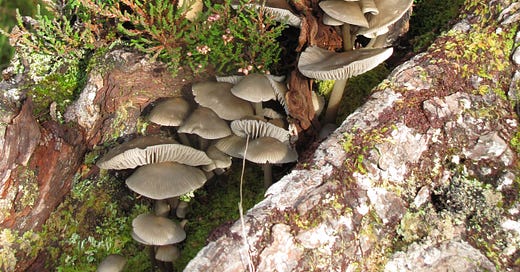



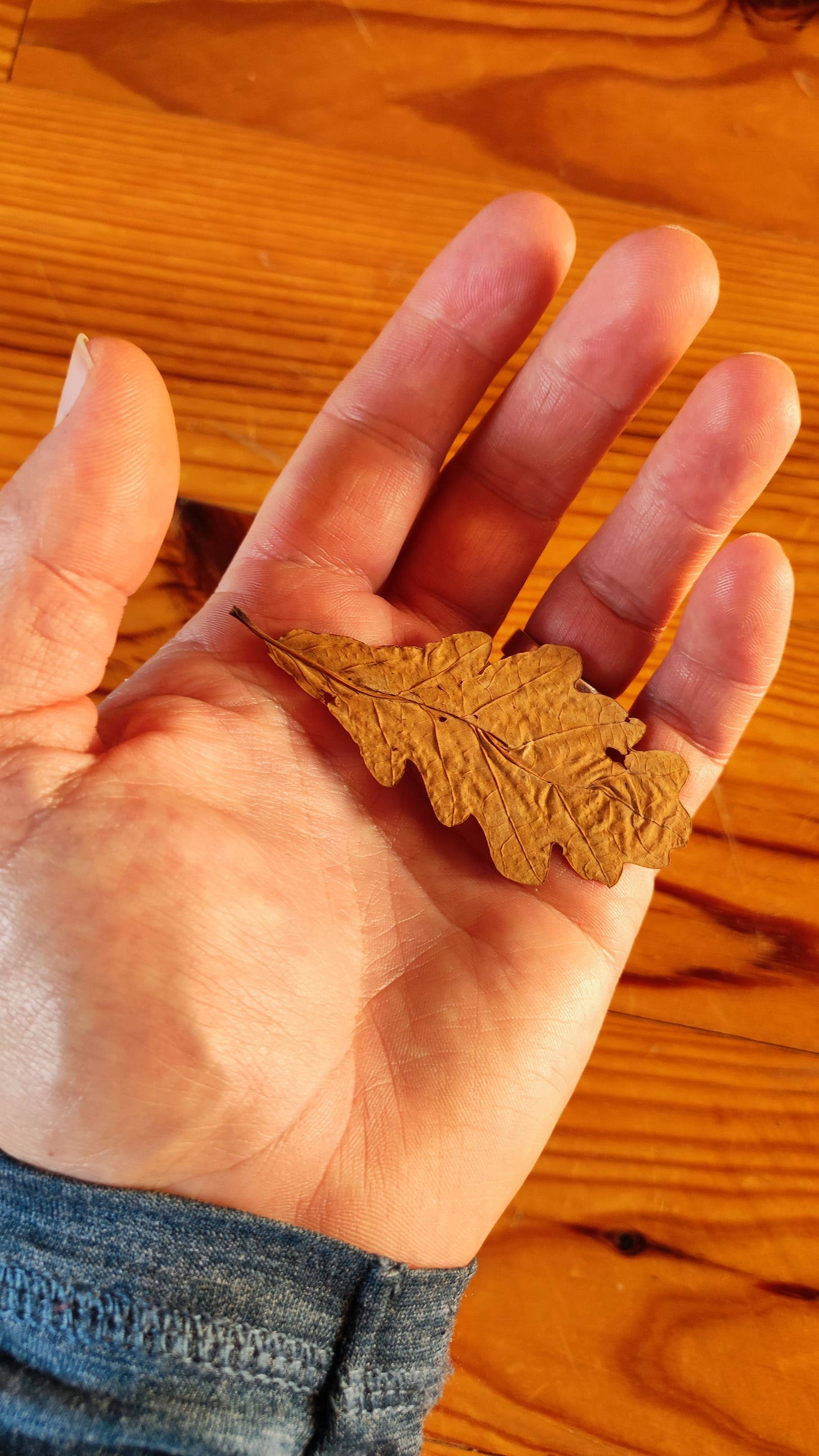

Well the election votes are being counted. Looks close. I had to stop watching on tv. I’m not going to lose any sleep over votes uncounted. I feel a woman president can lead this country with right choices and hope no violence. I am content to write, continue on a novel/memoir. I enjoy our conversations. Stay healthy. Flu season is upon us. I’ve never had a flu shot. Let my body build up its own defenses and stay healthy, eat low on ’totem pole’ vegan ad I can be.
Mugwort tea, yes a bit bitter, a dream enhancer as is black sage which I‘be taken for a runny nose in allergy season.it lets you sleep, but after 3-4 times has opposite effect and keeps you awake. I’ve leached California live oak and chopped up the acorn meat ,added wild onions and sautéed. Taste very close to hamburger. I woke up (12:40am) just to write a note. More in later morning here.